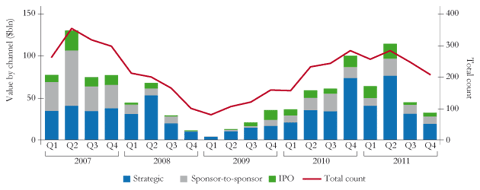The acquisition of Alliance Boots by US drug chain Walgreens in June is a rare example of an exit from a jumbo leveraged buyout through a strategic sale.
The deal was funded with £9 billion of debt. Finding a strategic buyer rather than an initial public offering for an exit of this size is quite an achievement. “In the case of mega-buyouts, the contraction in the amount of available debt and equity [relative to 2007] means that a secondary is highly unlikely or impossible, and because of the sheer size, a strategic exit is limited to a very small number of potential buyers,” says Matthew Grinnell, head of financial sponsors group, EMEA, at Barclays. “So the IPO becomes almost a default route.”
However, the deal is not assured. The exit is staggered over three years, with Walgreens buying 45% of Alliance Boots now. It has the option, but not the obligation, to acquire the other 55%. Nevertheless, KKR and its partners are expected to almost triple their money.
Walgreens is paying $6.7 billion in cash and shares for the 45%, and $9.5 billion in cash and shares in three years for the remainder, when it will also assume Boots’ outstanding debt (more than £7 billion). KKR will get back the majority of its $2.45 billion equity investment in Alliance Boots from the first stage of the deal alone: it is set to receive $1.8 billion in cash and seven million Walgreens shares, equivalent to $200 million, for its part of the 45% stake.
“Boots has performed well,” says Grinnell. “The owners and management have generated significant ebitda growth, and they have achieved an exit at a high multiple. If you buy at an historical high – as many businesses were in 2007 – and exit at less than an historical high, then it is very difficult to generate the expected return, even if the business performs as expected.
“Additionally, Boots and the owners were able to create equity value by buying back debt at a substantial discount during the crisis [something that seldom occurs].”
The staggered exit of KKR from the business – billed as a strategic partnership – is unusual. Private equity houses often retain a stake after an IPO – both to retain upside exposure to the stock and provide comfort to new shareholders worried that the business might have peaked. However, strategic buyers usually want to take control immediately: that’s why it’s a strategic acquisition.
Grinnell explains that the staggered exit in Alliance Boots’ case was a necessity. “[A single deal] would have been very large for Walgreens and it would have triggered a change of control that would have given lenders the option to seek repayment of their loans – an option many likely would have taken,” he says.
Other observers say the emphasis placed on the partnership signifies a shift in tone by the PE business and a recognition that the old PE business model has had to adapt to a more turbulent market environment and greater caution among prospective buyers.
This new environment also underscores the extent to which PE firms – particularly in the US and Europe – have had to explore other options in light of the moribund IPO market. Industry estimates suggest that while IPOs made up 37% of PE exit channels in Bric countries – a number flattered by IPOs in state-owned banks with PE sponsorship – and 16% in the Middle East and North Africa in 2011, in North America and western Europe the equivalent figures were 9% and just 1%, with exits dominated by trade sales and M&A.
| Private equity exits have slowed since mid-2011 |
| Global buyout-backed exits |
 |
| Source: Dealogic |
According to a recent report published by Bain and Company, the global market for PE-backed IPOs cratered from 45 offerings in the second quarter of 2011 to just 27 by the fourth quarter, and total IPO value fell from $17 billion to $4 billion. Dealogic states that 55% of the year’s initial filings were postponed or withdrawn. “Outside the US, the IPO market has been sporadic in nature,” Grinnell concurs. “Moreover, the IPO route requires a performing business and many investors [particularly outside the US] have been unwilling to embrace IPO candidates with high leverage.”
Alliance Boots was one of the last mega-deals of the boom years but could be a tough template to follow for other jumbo LBOs that have fared less well.
“The strategic acquisition shows that world-class businesses bought by financial sponsors in 2006 and 2007, when the securitization markets afforded sponsors large volumes of cheap debt, are still attractive to cash-rich international corporate buyers with investment-grade profiles,” says Edward Eyerman, head of European leveraged finance at Fitch Ratings.
“Most recent strategic acquisitions of legacy LBOs have come from Asia, where corporates, buoyed by strong currencies and low leverage, want to buy western brands or consolidate their European operations.
“Chinese food producer Bright Food’s purchase of the UK’s Weetabix, and Hutchison’s acquisition of Orange Austria are prime recent examples.”


